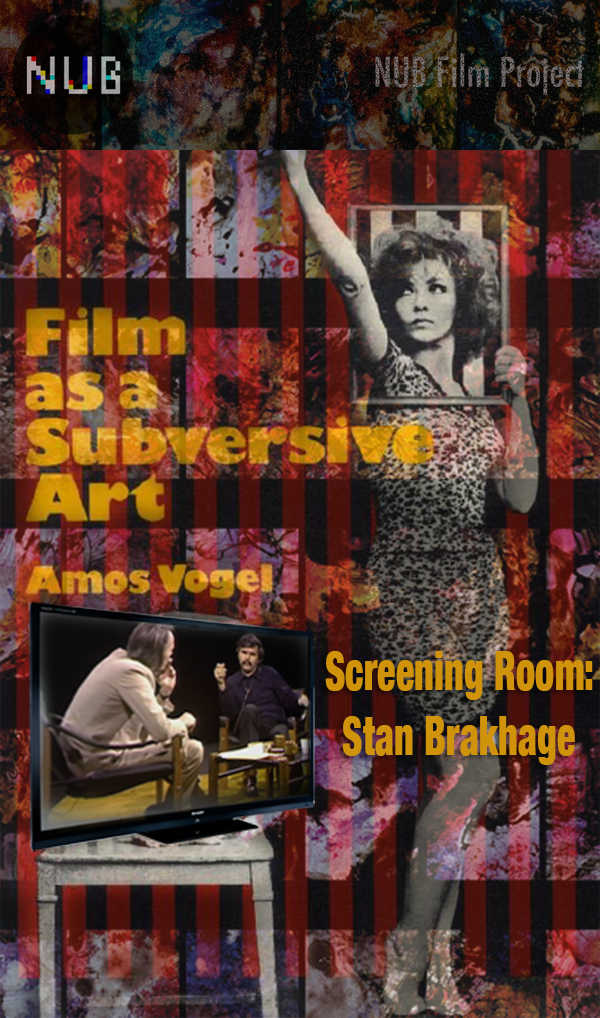NUB evening: A critical reading of Amos Vogel's book: Film as a Subversive Art + "Blue Moses" short film by Stan Brakhage + "Screening Room: Stan Brakhage" Sunday, 14th December, 19.00h at Project Goleb - doors open from 18.30h
NUB / New Underground Bioscope:
Ehsan Fardjadniya (Pirate Cinema), Maurizio Buquicchio (film theorist and historian) and Mirko Lazović are organizing series of movie screenings with talks at Goleb.
In the English language Nub is the "point" or the core of an issue or discourse. It can also be a "a small lump or protuberance", often referred to the remaining part of the limb of an amputee. Our project starts from the question that whoever approaches film as a form of art asks himself: what is cinema?
Since 1895 many theoreticians and filmmakers have asked themselves the same question, and answers have been differentiated, probably more than in any other ontological debate about expressive languages. Nevertheless, today we seem to passively accept the idea that film is what is projected before us on screens, of different sizes, in private and collective contexts. We believe that in the history of cinema there have been isolated, bold attempts perpetrated by small, sometimes poor or non-professional groups of people, to subvert the prevailing idea of what film was supposed to be, to oppose the ruling academism and kitsch.
Avant-garde and experimental filmmakers, authors of the so-called new waves from all over the world, and even directors from the classic period of film, have questioned the rules and tried to redefine what the essence, or the "nub" of film was.
Today we wake up feeling like the amputee trying to move his phantom limb, and rubbing our eyes we ask ourselves "what happened to avant-garde, underground, and experimental cinema?"
Rummaging through the ruins of an art considered already "dead" by many, we try to evoke that phantom. We invite you to perform a "bioscopy" of cinema with us, to ascertain if in its organism there are still signs of life.
Film as a Subversive Art & Screening Room
We would like to open our series of screenings with a critical reading of Amos Vogel's book Film as a Subversive Art. The book consists of a detailed anthology of films that for Vogel challenged, throughout history, the conventional idea of what cinema is, or to be more precise, what it became after a few decades from its invention.
The book is articulated in film frames, essays and short analysis of the films chosen by Vogel. In the first chapter, Weapons of Subversion: The Subversion of Form, the initiator of Cinema 16 discusses, among others, well known films such as Blow-Up (M. Antonioni 1966), 2001: A Space Odyssey (S. Kubrick 1968), Last Year in Marienbad (A. Resnais 1961). We decided to give space to the films in the book, which had less resonance through traditional circuits of distribution.
Therefore our "critical viewing" will start from Vogel's entry on Blue Moses by Stan Brakhage (USA, 1962): one of the least representative films by the American director, and yet maybe his most explicit statement on the ambivalent nature of narrative film.
Stan Brakhage (1933-2003) is one of the most significant film-makers in 20th-century non-narrative and experimental cinema. In his large and diverse body of works he explored varieties of techniques such as found-footage, hand-held camera, collage, paint and scratch celluloid and many more. To understand Brakhage's vision more accurately, we decided to show an episode of 'Screening Room' focused on him. 'Screening Room' was a 1970s Boston television series that during almost 10 years gave chances to independent film-makers to talk and show their film on TV. In this episode Brakhage discusses the films Eye Myth, Desist Film, Wonder Ring, Window Water Baby Moving, Moth Light, Blue Moses, Machine of Eden and The Wold Shadow. He returned to the program in the fall of 1980, where he showed Window, two excerpts from Short Films: 1975, Roman Numeral Series I and Creation.
Goleb
Burg. de Vlugtlaan 125,
1063 BJ Amsterdam, The Netherlands
Email: project.goleb@gmail.com
Website: Goleb

